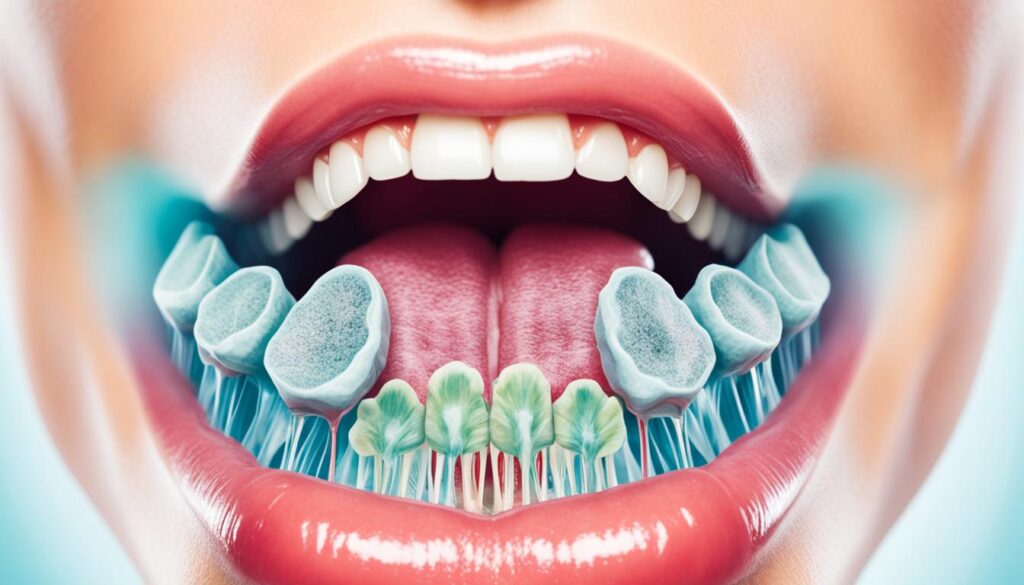Intermittent fasting is a popular dietary practice known for its potential health benefits. However, some individuals may experience a common side effect: bad breath. This unpleasant odor can be a result of various factors, including ketosis and excessive protein consumption. Fortunately, there are remedies available to combat intermittent fasting bad breath and maintain fresh breath throughout the fasting period.
Key Takeaways:
- Intermittent fasting can sometimes lead to bad breath due to ketosis and excessive protein consumption.
- Good oral hygiene practices, such as regular brushing, flossing, and using mouthwash, help maintain fresh breath during fasting.
- Staying hydrated and stimulating saliva production by drinking water can alleviate dry mouth and reduce bad breath.
- Natural remedies like apple cider vinegar and sugar-free gum can provide relief from intermittent fasting bad breath.
- Persistent bad breath during fasting may indicate underlying health issues, particularly related to kidney and liver function.
Understanding the Causes of Intermittent Fasting Bad Breath
Intermittent fasting can cause bad breath due to several factors. When the body enters ketosis during fasting, it produces ketone bodies, which can result in a unique smell of the breath. Additionally, consuming excessive protein during fasting can lead to the production of ammonia, another contributor to bad breath. Understanding these causes helps individuals make dietary adjustments to manage bad breath while fasting.
| Cause | Effect on Bad Breath |
|---|---|
| Ketosis | Produces ketone bodies, resulting in a distinct smell |
| Excessive protein consumption | Generates ammonia, contributing to bad breath |
During intermittent fasting, the process of ketosis occurs when the body shifts from using glucose as its primary energy source to utilizing stored fats. This metabolic state leads to the production of ketone bodies, including acetone, which can cause a noticeable change in breath odor. While in ketosis, it’s important to stay hydrated and practice good oral hygiene to minimize the impact of ketosis on bad breath.
Another cause of bad breath during intermittent fasting is excessive protein consumption. Protein is a vital macronutrient, but consuming too much protein during fasting can result in the liver converting it into ammonia. As a waste product, ammonia is excreted through the breath, leading to an unpleasant odor.

Managing Bad Breath During Intermittent Fasting
Lorem ipsum dolor sit amet, consectetur adipiscing elit, sed do eiusmod tempor incididunt ut labore et dolore magna aliqua. Ut enim ad minim veniam, quis nostrud exercitation ullamco laboris nisi ut aliquip ex ea commodo consequat.
Incorporating dietary adjustments can help manage bad breath during intermittent fasting. Limiting the intake of protein-rich foods can reduce the production of ammonia and minimize its impact on breath odor. Additionally, maintaining proper hydration by drinking enough water is essential to prevent dry mouth and the exacerbation of bad breath. Ensuring regular brushing, flossing, and using mouthwash also aids in reducing bad breath by removing bacteria and food particles.
Remember, understanding the causes of bad breath during intermittent fasting allows individuals to make informed choices and take necessary steps to prevent and manage this issue.
Tips for Fresh Breath During Intermittent Fasting
To maintain fresh breath during intermittent fasting, it’s essential to prioritize good oral hygiene practices. By incorporating these tips into your routine, you can effectively combat bad breath and enjoy a pleasant and confident fasting experience.
1. Brush regularly
Brushing your teeth at least twice a day, particularly after meals, helps remove food particles and bacteria that contribute to bad breath. Be thorough and pay close attention to all areas of your mouth, including your tongue.
2. Floss diligently
In addition to brushing, regular flossing is crucial for maintaining fresh breath. Flossing removes plaque and debris from between your teeth, reducing the chances of bacteria buildup and unpleasant odors.
3. Use mouthwash
Using an antimicrobial mouthwash can provide an extra layer of protection against bad breath. Look for alcohol-free options that contain antimicrobial ingredients, such as essential oils, to freshen your breath and kill bacteria.
4. Stay hydrated
During fasting, it’s important to stay hydrated to prevent dry mouth, which can worsen bad breath. Drinking plenty of water throughout the fasting period stimulates saliva production, helping to wash away bacteria and reduce odor.
5. Chew sugar-free gum or consume sugar-free mints
Chewing sugar-free gum or sucking on sugar-free mints can provide a quick freshening effect and mask any temporary bad breath. However, be mindful of the timing and ingredients, as some artificial sweeteners may break your fast.
By practicing these tips, you can ensure that your breath stays fresh and pleasant during intermittent fasting. Remember to prioritize oral hygiene and stay hydrated to maintain a confident smile throughout your fasting journey.

Natural Remedies for Intermittent Fasting Bad Breath
When practicing intermittent fasting, bad breath can be an unwanted side effect. Fortunately, there are natural remedies available that can help alleviate this issue and keep your breath fresh throughout the fasting period.
One such remedy is apple cider vinegar. Besides its well-known digestive benefits, apple cider vinegar can also help reduce bad breath. Incorporating this vinegar into your diet can promote gut health and contribute to fresher breath.
Another effective remedy is sugarless gum. Chewing on sugarless gum stimulates saliva production, which helps wash away bacteria and food particles that can cause bad breath. Plus, sugarless gum provides instant freshness without adding any extra carbohydrates to your diet.
These natural remedies for intermittent fasting bad breath offer a convenient and effective solution for combating the unpleasant odor. By incorporating apple cider vinegar into your diet and chewing sugarless gum, you can manage bad breath while reaping the benefits of intermittent fasting.
Potential Health Concerns Linked to Intermittent Fasting Bad Breath
Persistent bad breath during intermittent fasting may indicate underlying health issues, particularly related to kidney and liver function. The kidneys and liver play a crucial role in processing proteins and eliminating waste products from the body. When these organs are not functioning optimally, it can lead to the buildup of ammonia and other compounds that contribute to bad breath.
Monitoring the health of your kidneys and liver is essential, especially if you experience persistent bad breath during fasting. If you notice any concerning symptoms or have a history of kidney or liver problems, it’s important to seek medical intervention. Regular check-ups and tests can help ensure that your organs are functioning properly and address any potential health concerns.
Potential Health Concerns and Symptoms Related to Kidney and Liver Function
| Organ | Potential Health Concerns | Typical Symptoms |
|---|---|---|
| Kidneys | Kidney disease, kidney stones | Frequent urination, blood in urine, swelling, fatigue |
| Liver | Liver disease, fatty liver, hepatitis | Jaundice, abdominal pain, dark urine, fatigue |
By prioritizing the health of your kidneys and liver, you can mitigate potential health risks associated with bad breath during intermittent fasting. Consult with a healthcare professional for personalized advice and guidance on maintaining organ health alongside your fasting routine.
Conclusion
Intermittent fasting bad breath can be effectively managed and alleviated through various remedies and practices. By making simple dietary adjustments, such as reducing excessive protein consumption and incorporating foods that promote gut health, individuals can combat the unpleasant effects of bad breath during fasting.
Practicing good oral hygiene is also essential in maintaining fresh breath while following an intermittent fasting regimen. Regular brushing, flossing, and using mouthwash can help eliminate bacteria and food particles that contribute to bad breath. Additionally, staying hydrated by drinking plenty of water throughout the fasting period can help stimulate saliva production and mitigate dry mouth.
Furthermore, incorporating natural remedies like apple cider vinegar and sugar-free gum can provide quick relief from intermittent fasting bad breath. Apple cider vinegar promotes digestion and gut health, while sugar-free gum helps freshen breath without adding extra carbohydrates to the diet.
Overall, it is important to be aware of potential underlying health issues that may be linked to persistent bad breath during intermittent fasting. Monitoring kidney and liver function and seeking medical advice if necessary can ensure overall well-being. By following these strategies and maintaining good oral hygiene, individuals can enjoy the benefits of intermittent fasting while keeping bad breath at bay.


